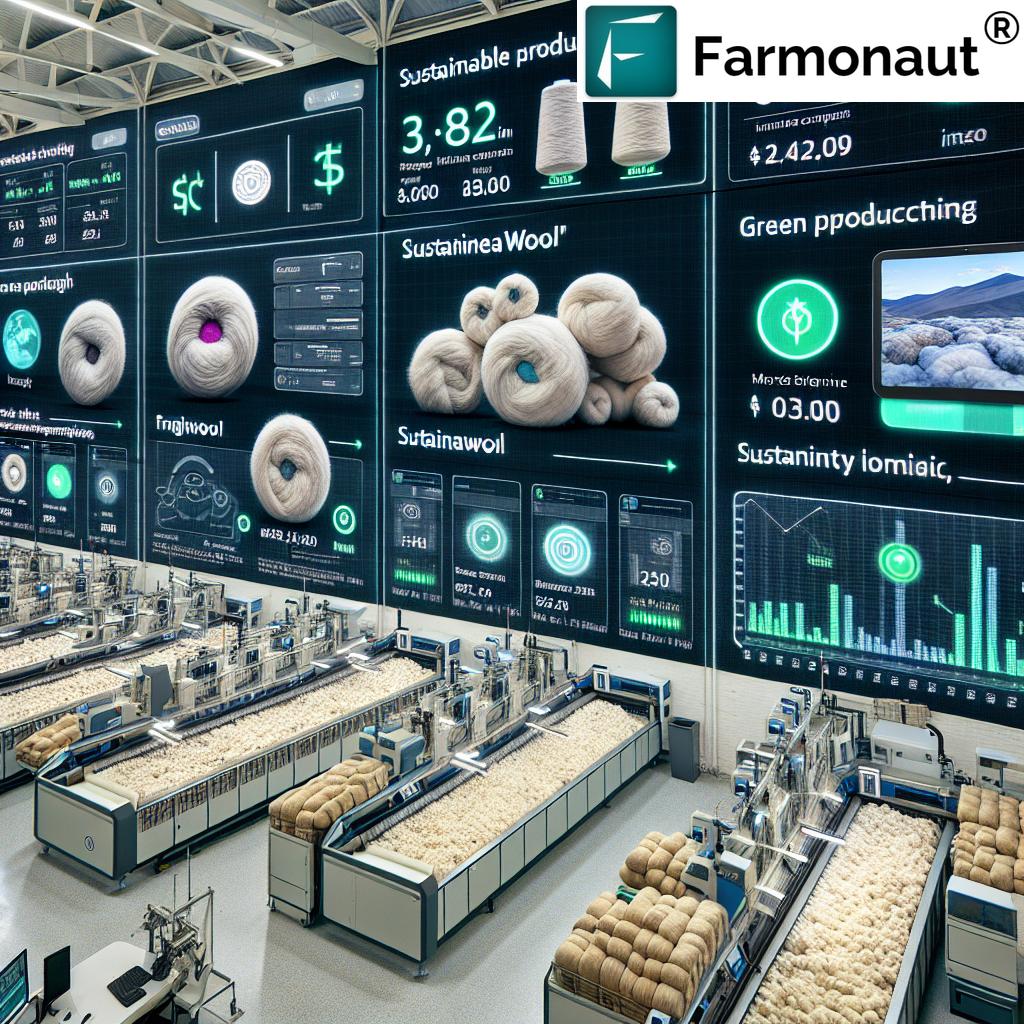Sustainable Wool Production: A Guide for Chinese Processors in the Australian Market

“The Australian Wool Sustainability Scheme (AWSS) covers over 60% of Australia’s wool production, promoting ethical sourcing and environmental responsibility.”
Welcome to our comprehensive guide on sustainable wool production, tailored specifically for Chinese processors navigating the Australian market. In this blog post, we’ll explore the latest trends, technologies, and best practices shaping the wool industry. Our focus will be on providing valuable insights to help you, as Chinese processors, make informed decisions and stay ahead in this dynamic market.
Introduction to the Australian Wool Market
The Australian wool market is renowned globally for its high-quality fibers and commitment to sustainability. As Chinese processors, understanding the intricacies of this market is crucial for your success. Let’s delve into the key aspects that make the Australian wool industry unique and how you can leverage these characteristics to your advantage.
The Importance of Chinese Processors in the Australian Wool Industry
Chinese wool processors play a pivotal role in the global wool trade, particularly in the Australian market. Your involvement is crucial for several reasons:
- Volume: Chinese processors handle a significant portion of Australia’s wool exports
- Value Addition: You transform raw wool into high-quality textiles
- Market Influence: Your demand shapes pricing and production trends
- Innovation: Chinese processing techniques contribute to product development
Given your importance, it’s essential to stay informed about sustainable practices and market trends to maintain a competitive edge.
Sustainable Wool Production: A Priority for Australian Woolgrowers
Sustainability has become a cornerstone of the Australian wool industry. As Chinese processors, understanding and aligning with these sustainable practices can provide you with a significant advantage in the market.
The Australian Wool Sustainability Scheme (AWSS)
The AWSS is a pivotal initiative that demonstrates Australia’s commitment to sustainable wool production. Here’s what you need to know:
- Scope: Covers over 60% of Australia’s wool production
- Focus Areas: Animal welfare, environmental stewardship, and social responsibility
- Benefits: Ensures ethical sourcing and environmental responsibility
- Relevance to Processors: Provides assurance of sustainably produced raw materials
By sourcing wool from AWSS-compliant producers, you can meet the growing demand for sustainably produced textiles in the global market.
SustainaWOOL: A Leading Certification Program
SustainaWOOL is another significant certification program in the Australian wool industry. As Chinese processors, being familiar with this program can help you make informed sourcing decisions:
- Focus: Animal welfare, land management, and social responsibility
- Certification Levels: Offers different tiers of certification
- Market Recognition: Widely recognized in international markets
- Processor Benefits: Ensures access to ethically produced, high-quality wool
Sourcing SustainaWOOL certified wool can enhance your reputation and meet the sustainability requirements of eco-conscious brands and consumers.
Wool Industry Technology: Revolutionizing Production and Processing
The wool industry is experiencing a technological revolution, impacting every stage from production to processing. As Chinese processors, staying abreast of these technological advancements is crucial for maintaining efficiency and competitiveness.
Smart Phone Apps for the Wool Industry
Mobile technology is transforming how wool industry stakeholders operate. Here are some key applications that are making waves:
- Market Data Apps: Provide real-time auction and price information
- Wool Classing Apps: Assist in accurate wool classification
- Farm Management Apps: Help woolgrowers optimize production
- Traceability Apps: Enable tracking of wool from farm to processor
As processors, leveraging these apps can help you make more informed decisions and streamline your operations.
Explore Farmonaut’s innovative solutions:
eBale: Revolutionizing Wool Bale Management
eBale technology is transforming how wool bales are tracked and managed throughout the supply chain. Here’s why it’s significant for Chinese processors:
- Efficiency: Streamlines bale identification and tracking
- Accuracy: Reduces errors in bale handling and processing
- Traceability: Enhances the ability to trace wool back to its source
- Integration: Can be integrated with existing processing systems
Adopting eBale technology can significantly improve your operational efficiency and traceability capabilities.
Australian Wool Market Trends: What Chinese Processors Need to Know
Understanding current market trends is essential for Chinese processors to make informed decisions and stay competitive. Let’s explore some key trends shaping the Australian wool market:
Sustainability as a Market Driver
Sustainability is no longer just a buzzword; it’s a significant market force. Here’s how it’s impacting the wool industry:
- Consumer Demand: Increasing preference for sustainably produced wool products
- Brand Requirements: Major fashion brands prioritizing sustainable sourcing
- Premium Pricing: Sustainable wool often commands higher prices
- Regulatory Pressure: Growing regulations around sustainable production and processing
As Chinese processors, aligning your operations with these sustainability trends can open new market opportunities and enhance your competitive position.
Auction Market Data: A Valuable Resource
Access to real-time auction market data is crucial for making informed purchasing decisions. Here’s why it matters:
- Price Trends: Helps in understanding short-term and long-term price movements
- Quality Premiums: Provides insights into price differentials for various wool qualities
- Supply Dynamics: Offers information on available wool volumes and types
- Market Sentiment: Reflects overall market conditions and buyer behavior
Utilizing tools and platforms that provide this data can significantly enhance your procurement strategies.
“Chinese wool processors handle approximately 75% of Australia’s raw wool exports, making them crucial players in the global market.”
Wool Processing Standards: Ensuring Quality and Compliance
As Chinese processors operating in the Australian market, adhering to established wool processing standards is crucial. These standards ensure quality, consistency, and compliance with international regulations.
Key Processing Standards
Several standards govern wool processing. Here are some of the most important ones:
- IWTO Standards: Set by the International Wool Textile Organisation
- ISO Standards: Relevant ISO standards for textile processing
- Environmental Standards: Regulations on water usage and chemical treatments
- Labor Standards: Ensuring fair and safe working conditions
Compliance with these standards not only ensures quality but also opens doors to premium markets that demand adherence to strict processing criteria.
Enhance your operations with Farmonaut’s API:
Compliance and Certification
Ensuring compliance with processing standards often involves certification processes. Here’s what you need to know:
- Audit Processes: Regular audits to verify compliance
- Documentation: Maintaining detailed records of processing methods and materials
- Training: Ensuring staff are trained in compliant processing techniques
- Continuous Improvement: Regularly updating processes to meet evolving standards
Investing in compliance and certification can enhance your reputation and open new market opportunities.
Ethical Wool Sourcing: A Priority for Chinese Processors
Ethical sourcing has become a cornerstone of sustainable wool production. As Chinese processors, understanding and implementing ethical sourcing practices is crucial for long-term success in the Australian market.
Key Aspects of Ethical Wool Sourcing
Ethical sourcing encompasses several important aspects:
- Animal Welfare: Ensuring sheep are treated humanely
- Environmental Stewardship: Minimizing environmental impact of wool production
- Fair Labor Practices: Ensuring fair treatment and compensation for workers
- Traceability: Being able to trace wool back to its source
By prioritizing these aspects in your sourcing decisions, you can meet the growing demand for ethically produced wool products.
Benefits of Ethical Sourcing for Processors
Implementing ethical sourcing practices offers several benefits:
- Market Access: Meeting requirements of ethical brands and retailers
- Risk Mitigation: Reducing reputational and regulatory risks
- Premium Pricing: Potentially commanding higher prices for ethically sourced wool
- Consumer Trust: Building trust with end consumers who value ethical production
Embracing ethical sourcing can differentiate your business in a competitive market.
Wool Production Forecast: Planning for the Future
Understanding wool production forecasts is crucial for Chinese processors to plan their operations effectively. Let’s explore the key factors influencing these forecasts and how to interpret them.
Factors Influencing Production Forecasts
Several factors contribute to wool production forecasts:
- Climate Conditions: Drought or favorable weather impacts flock sizes and wool quality
- Market Prices: Higher prices may encourage increased production
- Global Demand: Changes in demand can influence production decisions
- Regulatory Environment: New regulations may impact production methods and volumes
Keeping these factors in mind can help you better interpret and utilize production forecasts.
Streamline your operations with Farmonaut’s mobile apps:
Utilizing Production Forecasts in Processing Operations
Here’s how you can leverage production forecasts in your operations:
- Capacity Planning: Adjust processing capacity based on expected wool volumes
- Inventory Management: Plan raw material inventory levels
- Price Negotiations: Use forecast data in price negotiations with suppliers
- Product Development: Plan new product lines based on expected wool qualities and volumes
Effectively using these forecasts can help you optimize your operations and stay competitive in the market.
Industry Policy and Regulations: Navigating the Landscape
Understanding and complying with industry policies and regulations is crucial for Chinese processors operating in the Australian wool market. Let’s explore the key policy areas and their implications.
Key Policy Areas Affecting Wool Processing
Several policy areas have significant impacts on wool processing:
- Trade Policies: Tariffs, quotas, and trade agreements
- Environmental Regulations: Restrictions on chemical use and waste management
- Labor Laws: Workplace safety and fair labor practices
- Quality Standards: Compliance with wool quality and processing standards
Staying informed about these policies is essential for maintaining compliance and identifying potential opportunities or challenges.
Compliance Strategies for Chinese Processors
To navigate the regulatory landscape effectively, consider these strategies:
- Regular Policy Updates: Stay informed about policy changes through industry associations
- Legal Consultation: Seek expert advice on complex regulatory matters
- Compliance Audits: Conduct regular internal audits to ensure ongoing compliance
- Staff Training: Ensure your team is well-versed in relevant regulations and compliance procedures
Implementing these strategies can help you avoid regulatory issues and maintain a strong position in the market.
The “Keep Your Clip Clean” Campaign: Ensuring Wool Quality
The “Keep Your Clip Clean” campaign is a significant initiative in the Australian wool industry aimed at maintaining high wool quality standards. As Chinese processors, understanding this campaign is crucial for ensuring you receive high-quality raw materials.
Campaign Objectives and Benefits
The campaign focuses on several key areas:
- Contamination Prevention: Reducing foreign material in wool clips
- Proper Handling: Promoting best practices in wool handling and storage
- Quality Assurance: Ensuring consistent high-quality wool production
- Industry Education: Raising awareness about the importance of clean wool clips
By supporting and understanding this campaign, you can expect to receive higher quality wool, potentially reducing processing costs and improving final product quality.
Implications for Chinese Processors
The “Keep Your Clip Clean” campaign has several implications for your operations:
- Quality Control: Potentially reduced need for intensive quality checks
- Processing Efficiency: Cleaner wool can lead to more efficient processing
- Product Quality: Higher quality raw materials can result in superior end products
- Supplier Relationships: Opportunity to build stronger relationships with compliant suppliers
Engaging with suppliers who adhere to this campaign can lead to improved operational efficiency and product quality.
Wool Industry Education: Resources for Chinese Processors
Continuous education and skill development are crucial in the ever-evolving wool industry. As Chinese processors, staying informed and up-to-date with the latest industry knowledge can provide a significant competitive advantage.
Educational Resources and Programs
Several resources are available for wool industry education:
- Industry Webinars: Online sessions covering various aspects of wool processing and market trends
- Technical Workshops: Hands-on training in advanced processing techniques
- Industry Publications: Journals and magazines providing in-depth analysis and updates
- Online Courses: Specialized courses on wool science and processing technologies
Investing in these educational resources can enhance your team’s skills and keep your operations at the forefront of industry standards.
Collaboration with Australian Institutions
Collaborating with Australian educational institutions can provide valuable insights:
- Research Partnerships: Engage in joint research projects with Australian universities
- Exchange Programs: Participate in knowledge exchange programs with Australian wool experts
- Industry Forums: Attend and contribute to industry forums and conferences
- Certification Programs: Enroll in specialized certification programs offered by Australian institutions
These collaborations can provide unique perspectives and help you stay connected with the latest developments in the Australian wool industry.
Comparison of Australian Wool Sustainability Certification Programs
| Certification Program | Year Established | Key Focus Areas | Compliance Requirements | Benefits for Processors | Market Recognition | Adoption Rate |
|---|---|---|---|---|---|---|
| SustainaWOOL | 2015 | Animal welfare, land management, social responsibility | Annual audits, documentation of practices | Access to ethically produced wool, brand recognition | ~70% | ~35% |
| AWSS | 2018 | Environmental stewardship, animal health, traceability | Compliance with national standards, regular reporting | Assurance of sustainable practices, market access | ~80% | ~60% |
| Responsible Wool Standard (RWS) | 2016 | Animal welfare, land management, social welfare | Third-party certification, chain of custody | Global recognition, meets international standards | ~65% | ~25% |
| NewMerino | 2012 | Ethical wool production, traceability | Farm accreditation, supply chain verification | Direct sourcing options, traceability to farm level | ~50% | ~20% |
Frequently Asked Questions (FAQ)
To address common queries and provide additional clarity, we’ve compiled a list of frequently asked questions relevant to Chinese processors in the Australian wool market:
- Q: How can Chinese processors ensure they’re sourcing sustainably produced Australian wool?
A: Look for wool certified under programs like SustainaWOOL or AWSS, and work with suppliers who can provide traceability documentation. - Q: What are the main challenges in implementing sustainable processing practices?
A: Common challenges include initial costs of upgrading equipment, staff training, and ensuring compliance with various sustainability standards. - Q: How can processors stay updated on Australian wool market trends?
A: Regularly check industry publications, attend wool conferences, and utilize market data apps for real-time information. - Q: What impact does the “Keep Your Clip Clean” campaign have on wool processing?
A: This campaign results in cleaner wool clips, potentially reducing processing costs and improving final product quality for processors. - Q: How can Chinese processors benefit from Australian wool industry education resources?
A: Engage in webinars, workshops, and collaboration programs with Australian institutions to gain insights into best practices and innovative technologies.
Conclusion: Embracing Sustainability for Future Success
As we’ve explored throughout this guide, sustainable wool production and processing are not just trends but essential components of the modern wool industry. For Chinese processors operating in the Australian market, embracing these sustainable practices offers numerous benefits:
- Market Access: Meeting the growing demand for sustainably produced wool products
- Operational Efficiency: Implementing new technologies and standards can improve processing efficiency
- Reputation Enhancement: Demonstrating commitment to sustainability can boost your company’s reputation
- Long-term Viability: Aligning with sustainability goals ensures your business remains competitive in the evolving market
By staying informed about market trends, adhering to sustainability certifications, and continually educating yourselves and your teams, you can position your processing operations at the forefront of the industry. The future of wool processing lies in sustainable, ethical, and innovative practices, and by embracing these principles, Chinese processors can play a pivotal role in shaping a more sustainable and prosperous wool industry.
Remember, sustainability is not just about compliance; it’s about creating value for your business, your customers, and the environment. As you move forward, consider how you can integrate these sustainable practices into every aspect of your operations, from sourcing to processing to marketing your final products.
Stay connected with industry resources, collaborate with Australian partners, and continue to innovate. The path to sustainable wool processing may have challenges, but it also offers tremendous opportunities for growth and success in the global market.







